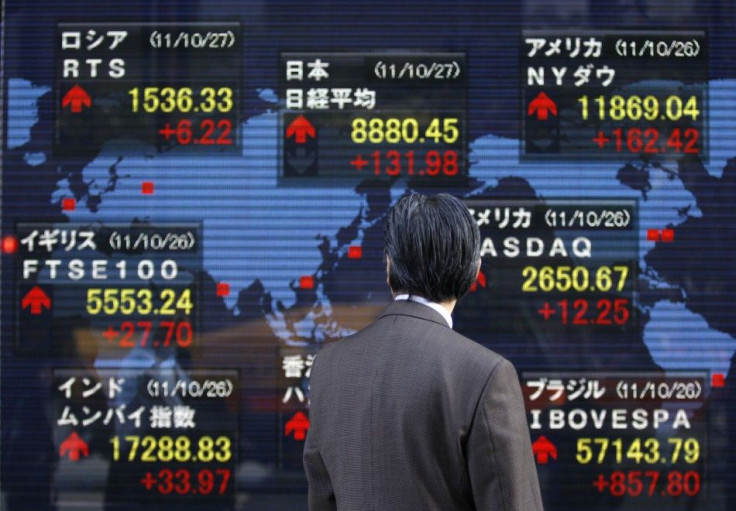Nikkei, Asia Markets Close Lower Wednesday on Downbeat Europe View

(Reuters) - Most Southeast Asian stock markets closed weaker on Wednesday in light trading volumes after the Federal Reserve warned that turmoil in Europe poses a big threat to the world's biggest economy.
The region's markets, like many others, have been on a downtrend due to concerns over slowing global growth. There's less appetite for risky assets due to the sovereign debt crisis in the euro zone, which investors fear faces downgrades by rating agencies.
The Federal Reserve on Tuesday warned that turmoil in Europe presents a big risk to the U.S. economy, even though it noted a somewhat stronger U.S. labor market.
Europe can't fix the problems. The United States is the most indebted. I am not doubting the recovery we are slowly seeing in America, but there are going to be many long lean years across the board, a Singapore-based equity analyst said.
So any rise in early 2012 should be used to reduce risk and put into more defensive position, if necessary. I don't think 2008/9 feat is going to be repeated in terms of growth rates in Asia. But it is going to be tough.
The benchmark Nikkei ended down 0.4 percent at 8,519.13, just above its 25-day moving average of 8,503, though it fell below that average earlier in the day.
The broader Topix index lost 0.5 percent to 736.98.
The Nikkei's loss was mostly in line with its regional peers, which followed U.S. shares down after the Fed's policy meeting on Tuesday.
Indonesia ended 0.3 percent weaker to a two-week low, Singapore fell 0.5 percent to hit its lowest close since Nov. 25, Malaysia closed 0.2 percent down, and Thailand lost 0.7 percent.
Vietnam, the region's smallest bourse, lost 1.1 percent, but the Philippines, bucking the trend, gained 0.1 percent.
Jakarta and Manila saw net outflows of $9.8 million and $1.6 million respectively, while Kuala Lumpur suffered $13.3 million net foreign selling.
Except Jakarta and Hanoi, all other markets saw light trade compared with their 30-day average volumes as jitters and the approach of year-end kept many investors to the sidelines.
Singapore Telecommunications Ltd and DBS Group Holdings Ltd each fell 0.9 percent, pulling the Singapore market down.
Analysts in Singapore said utilities, some industries and real estate investment trusts (REIT) will be the defensive shares that should be attractive in 2012, while technology shares may underperform.
In Bangkok, shares in CIMB Thai Bank surged more than 9 percent then fell to end only 2 percent higher on speculation it may buy a stake in TMB Bank Pcl,Thailand's seventh-largest lender, from the government.
Thailand's PTT Exploration and Production Pcl's (PTTEP) outperformed the overall market to closed 1.8 percent up to 172.5 baht as Citi raised its target price to 150 baht from 135 baht.
In Jakarta, a long-awaited land bill, which Indonesian lawmakers are expected to approve on Wednesday, may boost the overall market in 2012 analysts said.
Investors hope the bill will speed up land acquisition for government infrastructure projects in Southeast Asia's biggest economy.
Going into 2012 we remain overweight on banks, consumer, infrastructure and media. Cement and property names are also set to benefit if the land-bill is passed, said Dee Senaratne, head of research at CLSA Jakarta.
Its top picks are Bank Rakyat Indonesia, Astra International, Gudang Garam, Indo Tambangraya Megah and Jasa Marga.
Analysts in Hanoi said double-digit inflation will be the biggest concern for the stock market in 2012.
Foodstuffs, rubber and energy sectors will be outperformers, while the real estate industry could remain underperformers, Nguyen Tuan, investment director of FLC Securities in Hanoi said.
The MSCI's broadest index of Asia Pacific shares outside Japan fell 0.6 percent by 0945 GMT.
(Additional reporting by Hideyuki Sanol, by Singapore bureau, and by Duy Vu in Hanoi and Andjarsari Paramaditha in Jakarta.)
© Copyright Thomson Reuters 2024. All rights reserved.





















